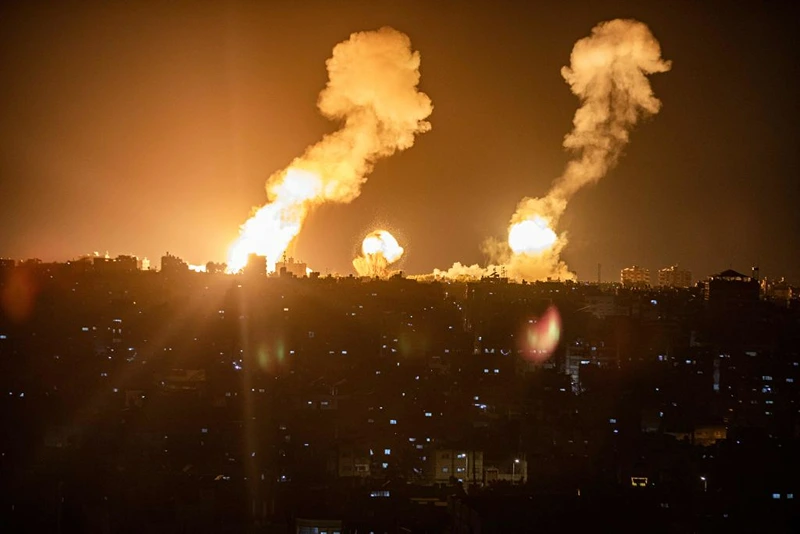
OAN Roy Francis
UPDATED 8:53 AM – Friday, April 7, 2023
The Israeli military conducted retaliatory airstrikes against targets in the Gaza Strip, followed by strikes into Lebanon on Friday morning.
The strikes into the Gaza Strip and Lebanon comes as retaliation for the rockets that were launched into Israel by militants in those areas. Palestinian militants had fired rockets from Gaza into southern Israel, and later 34 rockets were fired from Lebanon into Northern Israel, most of which were intercepted by the Iron Dome Defense System.
Hamas had denied launching the rockets from Gaza, and likewise Hezbollah denied involvement in the attack that came from southern Lebanon. However, both groups condemned the Israeli raids that had taken place at the Al-Aqsa Mosque during the past few days, which had escalated into violence and arrests when Israeli police encountered barricaded protestors inside the Mosque who threw rocks and fireworks at them. Both groups said that the rocket attacks were in retaliation for what Hezbollah called “a flagrant violation of believers in Jerusalem.”
On Thursday, Prime Minister Benjamin Netanyahu had convened his Security Cabinet after the rocket attacks from Lebanon. Following the conclusion of the meeting, his office released a statement suggesting that the military will be taking action.
“Israel’s response, tonight and beyond, will extract a heavy price from our enemies,” Netanyahu said.
The Israeli strikes into Gaza had targeted tunnels, production sites, research and development sites as well as weapon sites, according to military officials. However, no exact information was provided about what had been targeted in Lebanon. Lieutenant Colonel Richard Hecht, Israel Defense Forces International Spokesperson, had said that the airstrikes into Lebanon had mostly taken place in the Rashidieh area and the village of Kalila. Hecht said those areas are where the rockets that had been launched into Israel were launched from.
The Al-Manar news outlet, a Lebanese national news agency backed by the militant group Hezbollah, also reported explosions in the port city of Tyre, located in southern Lebanon approximately 20 miles from Israel’s northern border.
Israeli officials said that Hamas will not be allowed to operate from Lebanon, and that the nation will be held responsible for “hostile fire” that comes from within its borders.
“The IDF will not allow the Hamas terrorist organization to operate from within Lebanon and holds the state of Lebanon responsible for every directed fire emanating from its territory,” the IDF said in a statement.
Officials also added that the Iran-linked group Hezbollah in Lebanon is being investigated for their involvement in the rocket attacks.
The retaliatory strikes conducted by Israel were condemned by Hamas, saying that the airstrikes were “blatant Zionist aggression,” Lebanon also said that the country would also be submitting an official complaint with the United Nations Security Council over the strikes by Israel calling them “a flagrant violation of Lebanon’s sovereignty.”
Major General Aroldo Lazaro, commander of the United Nations Interim Force in Lebanon (UNIFIL) warned of a “serious escalation” due to the recent string of attacks in the region.
“Both sides have said they do not want a war,” UNIFIL said in a statement. “The actions over the past day are dangerous and risk a serious escalation.”
Lieutenant Colonel Hecht said that Israel is not seeking escalation and that de-escalation talks are proceeding in the political sphere.
“All eyes on Jerusalem [and we’re] hoping for a quiet day of prayers,” he told reporters. “Nobody wants an escalation right now. Everybody’s talking to everyone. There’s a lot of messaging going through political spheres to try to deescalate it.”
He went on to say that Israel wanted to avoid a “full-blown” conflict, and that “quiet will be answered with quiet.”
After the Israeli retaliation on Friday, two women in their 20s, believed to be sisters, were killed in a shooting in the West Bank near an Israeli Jewish settlement, and their mother, in her 40s, was injured and transported to a hospital.
Israeli authorities report that a Palestinian had been driving in the Jordan Valley when he opened fire on the three women as they were driving along the highway. Medics said that they had declared the two women dead on the scene.
Police found a Palestinian car nearby that appeared to be wrecked on the side of the highway, and are searching for the attacker who had fled the area.
No group has claimed responsibility for the shooting.
Meanwhile, the Israeli military stated that they are increasing infantry and artillery forces along Israel’s border with Lebanon and Gaza in a defensive move in order to “prepare for all possible scenarios.”
Stay informed! Receive breaking news blasts directly to your inbox for free. Subscribe here. https://www.oann.com/alerts

